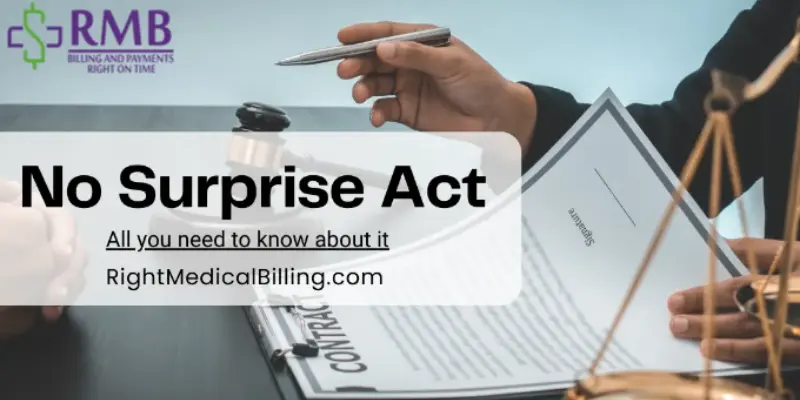What is No Surprises Act? – What should you need to know about NSA
Patients are often surprised when they see additional medical bills in their mailbox. Many patients believe that certain costs should have been covered by their health insurance. They are often unaware that certain healthcare services were not “in-network” but, in fact, “out of network.” There has always been confusion as to what the insurance covers and does not cover when the patient seeks emergent treatment. Thus, the No Surprises Act was established.
What is the No Surprises Act?

The 2020 No Surprises Act (NSA) has established new federal protections against surprise medical bills and balance billing which took effect January 1, 2022. Additionally, this act:
Prohibits balance billing for out-of-network emergency care and for post-stabilization care until the patient can consent and safely be moved to an in-network facility.
Prohibits balance billing for scheduled out-of-network services at an in-network facility when the patient hasn’t been notified or provided consent.
Prohibits insurers from assigning higher deductibles (and other cost-sharing) to patients for out-of-network than they do for in-network care without patient notification and consent.
Provides similar patient protections for air ambulance services, but not ground ambulances.
What is Surprised Billing?
Surprise billing occurs when an individual (the patient) receives an unexpected bill after obtaining items or services from an out-of-network provider, facility, or provider of air ambulance services where the individual did not have the opportunity to select a provider, facility, or provider of air ambulance services covered by their health insurance network, such as during a medical emergency.
In such cases, the individual’s health plan often does not cover the full amount of the out-of-network charges, and the out-of-network provider, facility or provider of air ambulance services then bills the patient for the outstanding amount. Prior to the NSA, the patient would often be responsible for paying these bills. These so-called bills are also known as “balance bills.”
What the No Surprises Act Has Changed in the Healthcare Industry
The NSA covers a scope of healthcare services. In certain situations, patients will now be required to not pay anything over their in-network cost-sharing amounts. Health plans, issuers, and Federal Employees Health Benefits (FEHB) Program Carriers must pay the out-of-network provider, facility, or provider of air ambulance services an amount in accordance with a state All-Payer Model Agreement or specified state law. It is important to note however, that in the absence of an All-Payer Model Agreement or specified state law (varies from state to state), the plan must make either an initial payment or a denial of payment within 30 days.
If either party believes that the payment amount received is not appropriate (being either too high or low), the party has 30 business days from the date of initial payment or denial of payment to notify the other party that it would like to proceed with the negotiation process.
After properly notifying, the parties may choose to enter a 30-business-day open negotiation period to determine an alternate, agreeable payment amount. If that open negotiation is unsuccessful, the NSA also provides for a Federal independent dispute resolution process (Federal IDR Process) whereby a certified independent dispute resolution entity will review the specifics of the case and the items or services received and determine the final payment amount. It is important to note, that both of the parties must exhaust the “30-business-day open negotiation period” before requesting another payment through the Federal IDR Process.
Under certain circumstances, the qualifying payment amount (QPA) becomes the basis for determining individual cost sharing for items and services covered by the balance-billing protections in the No Surprises Act. Some key takeaway points are displayed below.
Key Points about No Surprises Act (NSA)
- Approximately 20% of ER visits and 9-16% of hospitalizations result in surprise out-of-network medical bills.
- The No Surprises Act requires clinicians providing non-emergency care to provide good faith estimates of services when care is scheduled at least 72 hours in advance or upon request from individuals who are uninsured or self-pay. You do not need to issue a good faith estimate for emergency care.
- The No Surprises Act requires health insurance companies to apply out-of-network bills to member’s in-network deductible and co-Insurance.
- The No Surprises Act requires out-of-network doctors to NOT ‘Balance-Bill’ patients for any additional payment.
- The No Surprises Act states that insurance companies and providers MUST NEGOTIATE A PAYMENT AMOUNT for out-of-network bills using the Qualifying Payment Amount (QPA) as guidance.
- The QPA is the medical in-network allowed amount an insurance company pays providers for a medical service in a particular geographic region.
The Texas Medical Association recently sued regarding the QPA, and a Federal judge sided with them saying that the QPA cannot be the sole determinant of the amount paid by the insurance company to the provider. The No Surprises Act is still relatively new but has brought forth many new challenges to our healthcare billing system. It is important for all healthcare professionals to stay informed.



